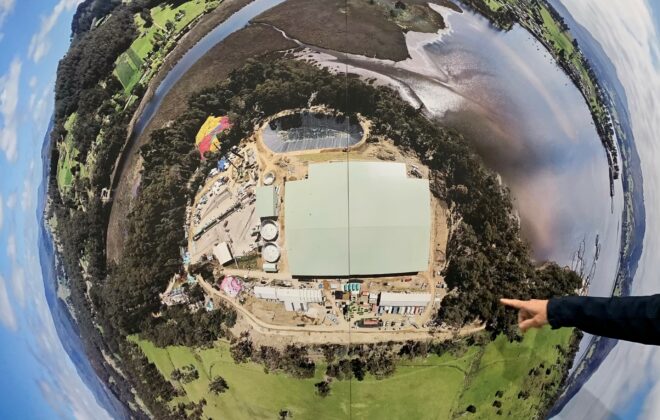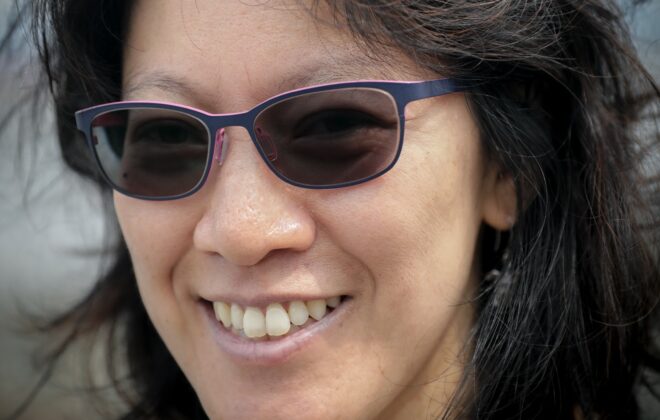What did we brew at the AFINO 2024 conference?
The positive energy from the AFINO conference has not yet dissipated and many ideas are still buzzing across the network. Therefore, we want to share with you some of the exciting things that happened there. In particular, we want to give you a taste of the more social and interactive activities. Hopefully, this will bring you both some interesting ideas and an impression of the lively vibe we experienced at AFINO 2024. So, let’s start with the more relaxed and less conventional happenings.
Crisp ideas or ideas instead of crisps?
On the two first days, we offered two aperitif talks to keep stimulating people’s brain until the very hand of the day! But we tried to do that in a more relaxed and entertaining way. So, the first evening Kristian Alm and Heidi Karlson discussed with the British journalist Martin Bright the movie “Official secrets”, which was shown after dinner. The 2019 film directed by Gavin Hood, tells the story of Katharine Gun, a whistleblower who exposed illegal operations by the British and US’s intelligence service to influence UN diplomats voting decision on the 2003 invasion of Iraq. Bright played a major role in bringing the case to the attention of the public and besides has a long-standing interest in the fate of whistleblowers who expose governments’ misbehaviour. This talk, and the film complemented very nicely the parallel sessions on whistleblowing (more below). The timing also proved almost uncanny, since the talk happened in between the British police’s arrests of journalist Richard Medhurst and of pro-Palestinian activist Sarah Wilkinson, guilty of not being aligned with Westminster’s foreign policy.
The second aperitif talk was a little more of an AFINO self-celebration, since it was a discussion of the forthcoming book “The Fragility of Responsibility” that brings together the experience and learning of the AFINO network. Jacob Dahl Rendtorff surprised the audience, revealing that behind his reclusive scholar persona lies the spirit of a great entertainer, who managed to keep a tired and hungry crowd remarkably engaged. Thanks to his verve, the conversation with the book editors, Giovanni De Grandis and Anne Blanchard, was fun and peppery. We won’t get into the content of the book here, because we have some surprises in store to promote it, and to whet your appetite for reading it!
Learning together to learn together
A rather original feature of the conference was a series of workshops, that were offered on Thursday. We called them interactive sessions both because we wanted to stress that they were meant to be moments of active participation where the speaker-audience divide was removed, and because they were meant to be learning moments both for the participants and the organizers of the sessions. Workshops play a key role in most transdisciplinary research, but we think that there is still a lot of work to do to promote strategies of experimenting, learning, checking the quality of learning and disseminating it effectively.
Our interactive sessions did not have any such grand ambition, they were just an occasion to practice such methods, make them known and reflect on their limitations and potentials. Even though so much happens in terms of workshops to bring together people with different knowledge and different perspectives, it is not easy to orient oneself amid the methods on offer and to have a taste of them. We think that the success of our interactive sessions show that there is a need to create more occasions to learn more those methods and techniques, trying and discussing them, and also actually using them and getting the most out of them.
There were two interactive sessions, each offering three options among which participants could choose.
| First interactive session | Option I | Option II | Option III |
| Exploring the frontiers of future foods: The case of cultured meat | Using ‘Ethics in Research’ cards as a practical tool for responsible engagement and reflection in research practice. | A Future Literacy Lab taster: What future for RRI in Norway? | |
| Lead by Erik Bjørnerud (Høgskolen i Østfold) and Richard Helliwell (Ruralis) | Facilitated by Anne Ingeborg Myhr, Torill Blix and Sigfrid Kjeldaas (NORCE) and Kate Millar (University of Nottingham) | Lead by Per Koch (NIFU) and Riel Miller (UiS) |
| Second Interactive session | Option I | Option II | Option III |
| RRI Collaborations with business and researchers for a sustainable future: challenges and opportunities | Meeting the Inclusion Challenge in Innovation: Giving Voice to Users | Anticipation or vision? How to be responsible for the future? | |
| Led by Veronica Ski-Berg (NIFU) and Lina Ingeborgrud (NIFU) Featuring a panel of experienced guests: Anne-Grete Haugen (Matvett), Ellen-Marie Forsberg (NORSUS), Nhat Strøm-Andersen (Nibio) and Hege Sørlie (ISS Facility Services AS) | Lead by Tatiana Al. Iakovleva (UiS) and Judy Hong Huang (UiS) | Lead by Tora Bonnevie (NTNU), Natalia Murashova (Høgskolen i Østfold), Giovanni De Grandis (NTNU) |
Let’s have a quick look at each workshop.
In Exploring the frontiers of future food Erik Bjørnerud and Richard Helliwell adapted to the circumstances the World Café method, in which participants work in small groups and reflect together on some questions proposed by the moderators. This well-tested method provided a good setting for discussing some possible implications of cellular agriculture. This emerging technology (which was also discussed by Sissel Rønning in a plenary session) promises to cultivate meats and milks through precision fermentation and cell reproduction in the bioreactor. If successful, these innovations would sever, or drastically reduce, the need to rear animals to produce meat and fundamentally remake livestock food systems. This raises many questions. The session focused on three: 1) What do these technologies mean for power in the food system? 2) How can we anticipate the effects of future cellular agriculture infrastructures? 3) How to concretely implement RRI in this research context? The interactive session managed to elicit a broad range of ideas and open questions. The inputs show that there are many open questions, challenges and opportunities and provided a taster of the perspectives and pertinent questions emerging as soon as we engage in serious critical discussions around cellular food futures.
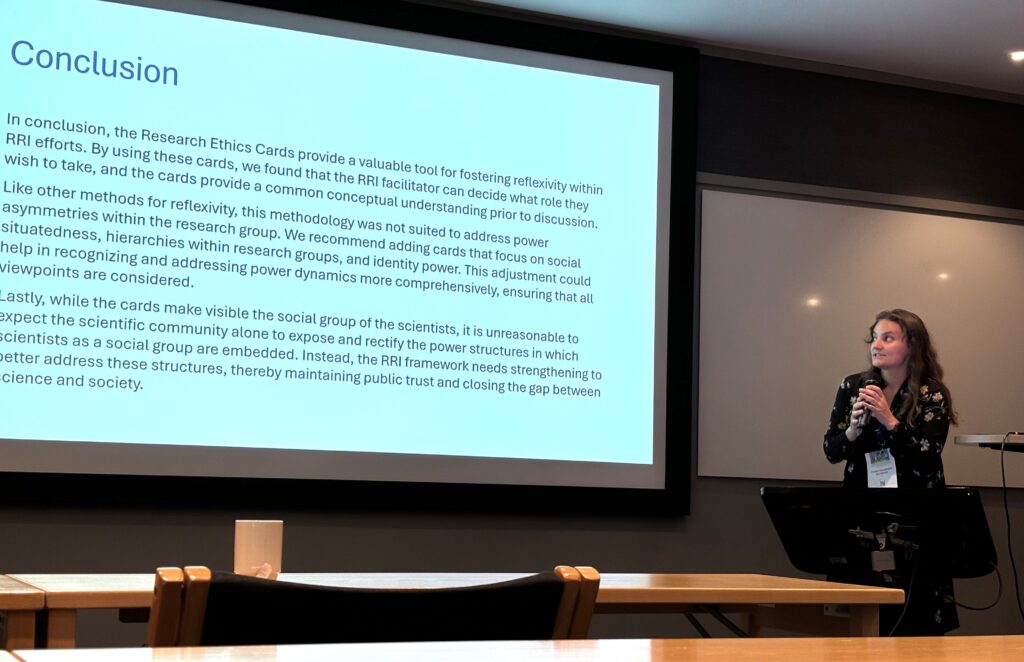
Using ‘Ethics in Research’ cards as a practical approach for responsible engagement and reflection in research practice examined the role of new tools that have been developed to support engagement with ethics and the embedding of RRI in research programmes, specifically focusing on the use of the ‘Ethics in Research’ Cards, developed at the University of Nottingham, UK. The ‘Ethics in Research’ Cards were designed to support reflection and consideration of the ethical and social issues raised by research. The Cards present issues and questions that are intended to be relevant to all disciplines and cover aspects of research ethics, research integrity and extend to concepts of RRI. Under the expert lead of Kate Millar and of a team of researchers from NORCE, the participants got the chance of trying the cards and experience how they can facilitate ethical discussion.
The Futures Literacy Laboratory taster offered the opportunity to experience an influential approach to future thinking under the guidance of the father of this method: Riel Miller. Futures Literacy (FL) laboratories are one to two days collective exercises where the participants explore a topic while brainstorming about possible futures. The point is not to predict the future, but to reveal the ideas the participants have about the future. This helps them and the other participants reflect on their own preconceptions, mental maps and the institutional structures they are part of, which again makes previously unseen possibilities and challenges reveal themselves. Riel Miller gave a short presentation of Futures Literacy thinking and method, before inviting the participants to a short lab meant to give them an idea of what this is about. They chose a topic from higher education and research. Using post-it notes and round the table discussions, the two groups identified stories and observation from 2060. The groups were facilitated by future literacy experts from NIFU. Finally, representatives of the two groups presented the results to all.
Inclusive workshops rooted in AFINO practices
With 22 participants the workshop on the Challenges and opportunities of business and researchers’ collaborations for RRI was surely a success. The workshop explored this main question through a brief panel discussion, group discussions and some easy exercises for all participants, using Mentimeter to create word clouds. For the panel, we were lucky to have experienced guests, namely Anne-Grete Haugen (Matvett), Ellen-Marie Forsberg (NORSUS), Nhat Strøm-Andersen (Nibio) and Hege Sørlie (ISS Facility Services AS).
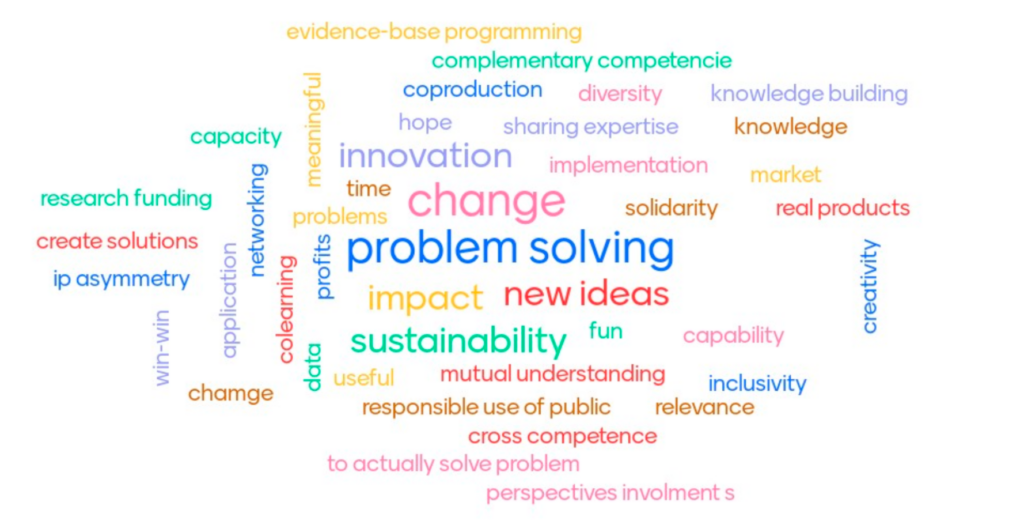
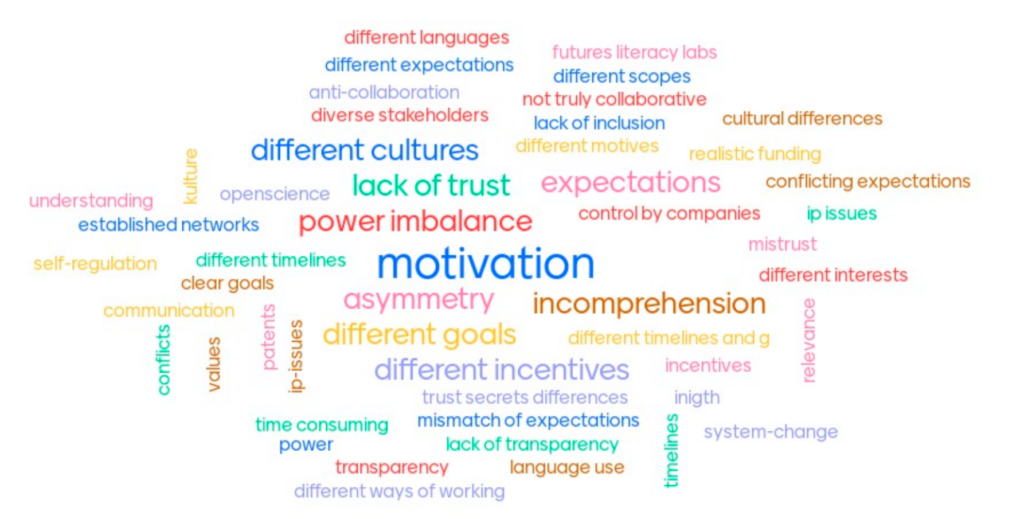
The word clouds created at the session, based on the question “What are some challenges when businesses and researchers collaborate for a sustainable future?”
The AFINO-associated BREAD project was central to the panel conversation, discussing what to expect from and how to collaborate with project partners representing a different sector. For example, industry representatives pointed to the need to understand the usefulness of an academic concept; “what does this mean in practice, and how can I use this to improve my work?”. Most of the participants worked in academia, and thus there was quite a lot of interest in the experiences of the panel members representing the industry side.
Based on the work and experience of the AFINO-associated project “Releasing the power of users”, the workshop Unlocking the Power of User Inclusion in Innovation, led by Tatiana Iakovleva, highlighted the critical role of users in shaping meaningful innovation, from generating fresh ideas to ensuring successful implementation. Presenters Ingrid Adriaensen and Hilde Vandenhoudt from LiCalab, alongside Judy Huang from the University of Stavanger, shared valuable insights into best practices from Living Labs in Norway and Belgium. Through interactive Mentimeter-powered sessions, participants exchanged experiences and gained exclusive insights from the forthcoming book, Meeting the Inclusion Challenge in Innovation. The event emphasized the power of user voices in co-creating impactful innovations, a theme that was also stressed by John Bessant in his keynote speech.

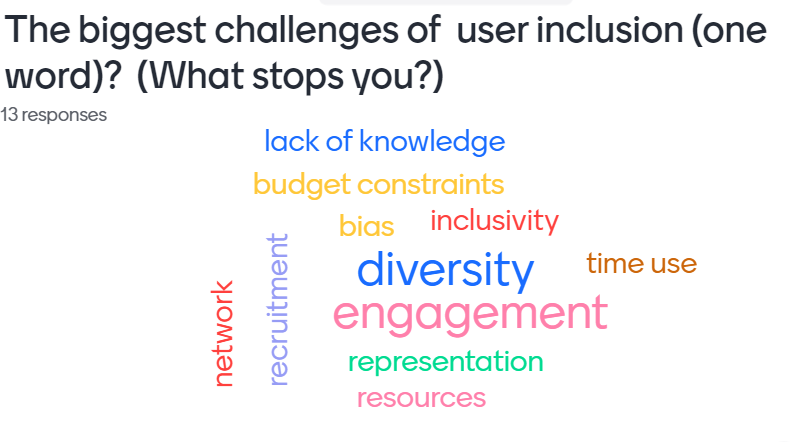
Word clouds created by participants at the session Unlocking the Power of User Inclusion in Innovation.
The Anticipation or vision workshop also stemmed from AFINO’s experience, namely from the Sustainable Healthy Futures pilot project. The workshop facilitators, Tora Bonnevie, Natalia Murashova and Giovanni De Grandis have all been involved in the pilot.
The workshop used a blend of individual exercises, polling ideas through Mentimeter, a presentation, and work in small groups and general discussion to explore possible differences and similarities between anticipatory and vision exercises as future thinking processes. We wanted to see if the participants saw different implications for responsibility, inclusion and implementation between thinking in terms of anticipation or vision.
The collaborative outcomes highlighted certain differences in the two future thinking approaches and their specific strengths, but also the challenges of disentangling the two – both by definition and by cognitive processes. Even if the results were ambiguous, the session was inspiring and informative for possible future investigations of this topic. One of the aspects we were especially curious about, the emotive overtone of the two concepts (anticipation and vision) proved very controversial.
Snapshots from the parallel sessions
Giving an exhaustive account of the parallel sessions is not possible in this short blog. Therefore, I will just offer a few examples, which I hope will give at least a glimpse of what happened.
For a fuller picture, you can download the abstract book: AFINO 2024 – BOOK OF ABSTRACTS
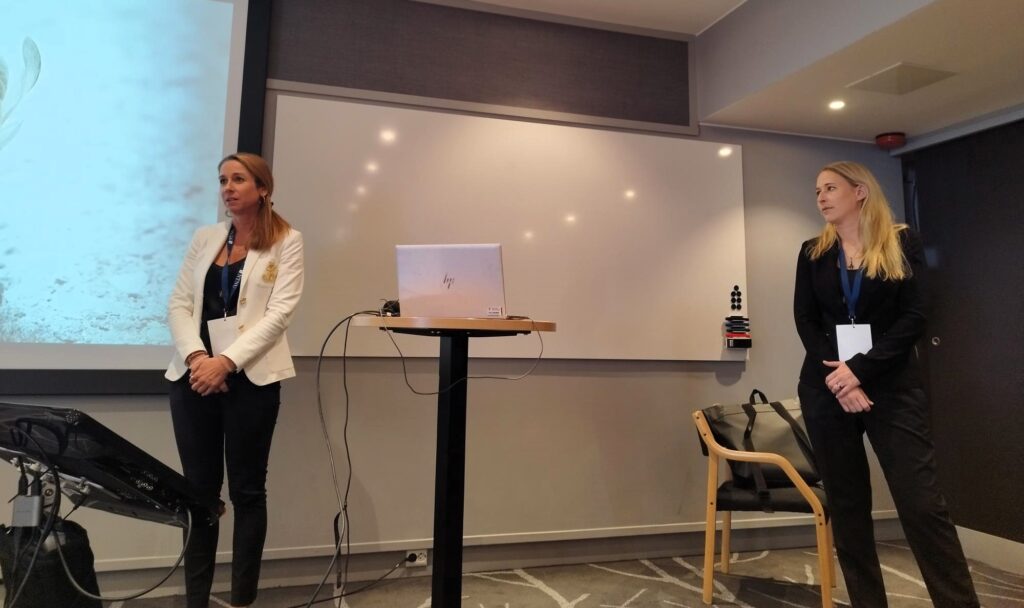
It seems fair to begin with the most popular track, “Bringing Responsibility to Firm Practices: How?“ The three sessions, held over three conference days, covered a broad spectrum of topics: from ecosystem development in fostering inclusive practices to historical case studies. The presentations and ensuing discussions significantly enriched the participants’ understanding of responsible firm practices, a crucial area in the evolving field of Responsible Innovation (RI). The track emphasized the importance of integrating responsibility into business operations, a growing priority as firms face increasing demands for ethical, sustainable, and socially impactful practices.
The sessions attracted presenters from diverse cultural backgrounds, with papers covering a wide geographical range, including Belgium, Germany, Norway, the Netherlands, Brazil, Japan, and Turkey. The authors employed a variety of methodologies, such as structured literature reviews, statistical analyses, case studies, and ethnographic perspectives, adding depth and richness to the discussions. The track organizers—Tatiana Iakovleva, Arnt Fløysand, Elin Oftedal, Luciana de Silva, and Vincent Block—are very happy and grateful to the contributors. They are also following up this track with a Special Issue of the Journal of Responsible Innovation, titled “Bringing Responsibility to Firm Practices: Strategies and Challenges”.
An example of a very different track, focused on a very specific topic, is the session “CRISPR for responsible animal breeding”. It included presentations targeting responsibility of experts and advisory boards in the public debate, tools for acknowledging sustainability and RRI in projects and applications, and findings from stakeholder and public engagement concerning the use of genome editing. Studies from Norway and Australia were presented and enabled good discussions among the participants. During the session, it became clear that a more democratic governance of genome editing is needed, where inclusion of more perspectives than those of the experts is needed for ensuring a more responsible and sustainable way forward.

As we have mentioned it in presenting the aperitif talk on the “Official secrets” film, we should also single out the track “Breaking the Silence. Historical and cross-cultural perspectives on whistleblowing“. The track grows out of an important AFINO initiative at the BI Norwegian Business School in Oslo that is building an international bibliography on whistleblowing. Accordingly, presentations focused on whistleblowing practices across various countries including South Africa, Brazil, Italy, the UK, France, and Norway. These discussions proved to be highly stimulating, reflecting diverse international perspectives on the topic.
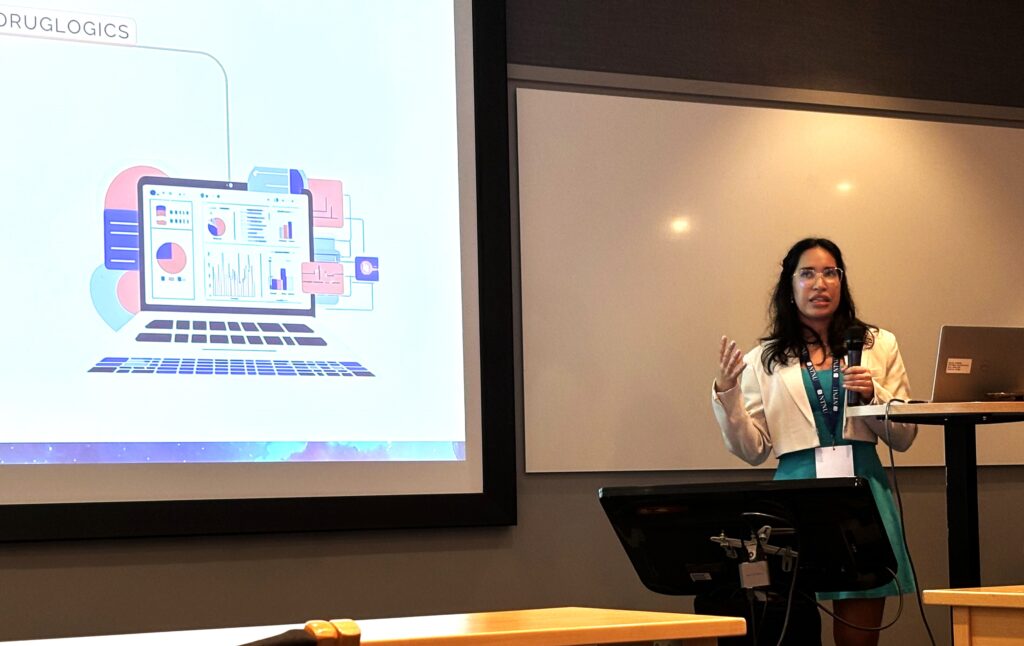
Finally, we can also mention a session springing from a collaboration between AFINO and its sister project: Digital Life Norway (DLN): Brave new RRI: challenges for early career researchers and biotech. The session grows out of the two projects concern for supporting young researchers involved with RRI, transdisciplinarity, and other engaged forms of research. The two sessions aimed to explore the tensions and opportunities of early career researchers when working with or on RRI. The presenters went from sharing reflections on how RRI might be interpreted and implemented in the field of biotechnology, to discussing the role of policy institutions (like the Research Council of Norway) in concretely supporting the deployment and implementation of RRI in projects, to reflecting on the attempt to bridge the gap between research in education and teaching practice, to finally present attempts at encouraging reflexivity and responsibility in natural sciences by means of journaling. This led to discussing the need to deeply integrate, from the beginning, RRI efforts into the research projects, and across the research and policy institutions. For this integration needs to be supported with adequate means, rewards and long-term perspectives.
For a fuller picture of the sessions, we will soon provide an abstract book, for free download.
Whereof we cannot report, thereof you must not miss
It would be impossible to do justice in a short space to the intellectual depth and breadth of the keynote speeches (see the list below) and of the following discussions. As the supporters of Napoli’s football team wrote on a cemetery when Maradona led the team to win its first Italian championship: “What have you missed!”. But, unlike the Neapolitan departed, you have the chance to show up next time!
| Plenary sessions | Invited speakers |
| CSR and RRI: past, present and future | John Bessant and Vincent Blok, moderated by Harald Throne-Holst |
| Biotechnologies for the good life | Kate Millar and Sissel Rønning, moderated by Anne-Ingeborg Myhr |
| Transdisciplinarity, foresight and the science-policy interface | Ulrike Felt and Riel Miller, moderated by Per Koch |
| The path towards responsible AI | Margit Sutrop, Christian Fieseler, and May Thorseth, moderated by Matthias Kaiser |
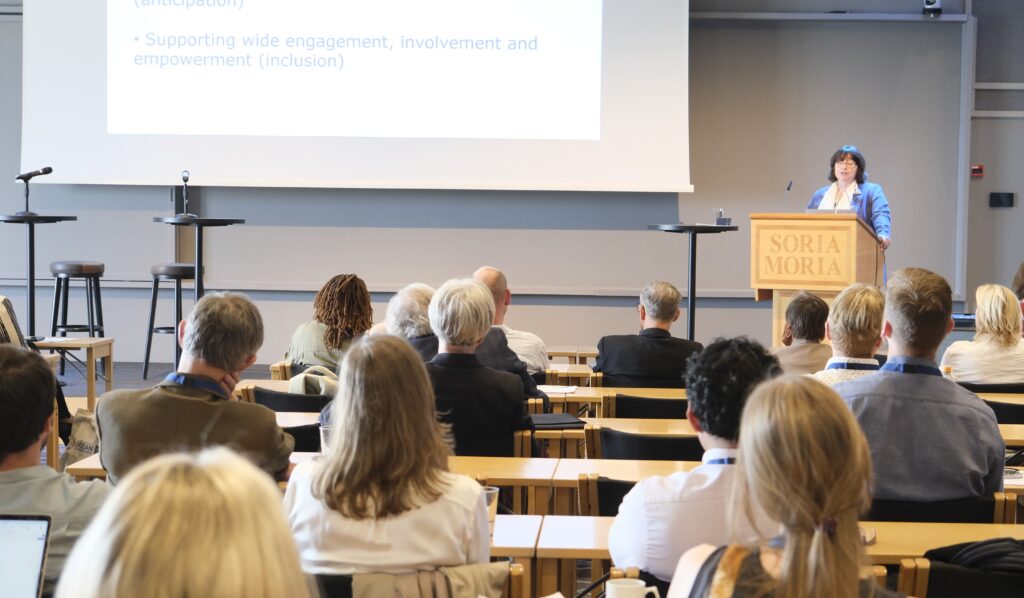
This blog entry would have not been possible without the help of many colleagues who sent me their report of the interactive sessions and of the parallel sessions. I have used them liberally and often verbatim.
A big thank you to Anne Blanchard, Tora Bonnevie, Luciana Maines Da Silva, Richard Halliwell, Tatiana Iakovleva, Lina Ingeborgrud, Heidi Karlsen, Per Koch and Anne Ingeborg Myhr.
—
Featured image: From the first plenary session, with keynote speaker John Bessant (Emeritus Professor, University of Exeter) in action.
Unless otherwise stated, photos and video are by Eva H. Murvold.
Find more to read and photos from the AFINO International Conference here: How to make a mark

Giovanni De Grandis
Giovanni De Grandis has a PhD in Philosophy. In the last ten years he has worked in several transdisciplinary projects and initiatives in the areas of health, new technologies, innovation and public policy. He is the coordinator of the AFINO project and leads Work Package 2.


